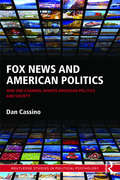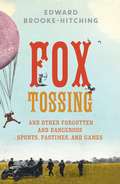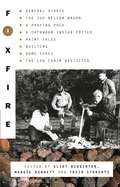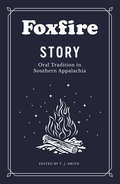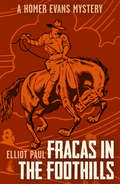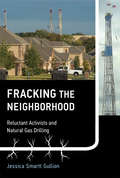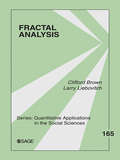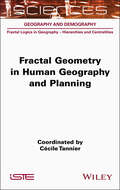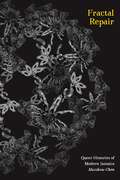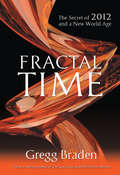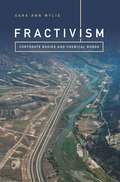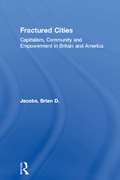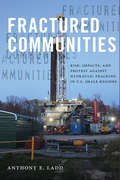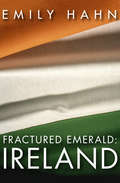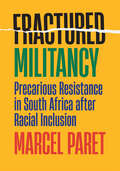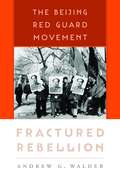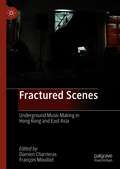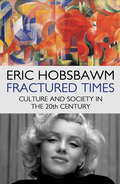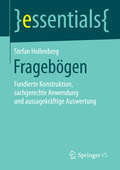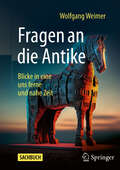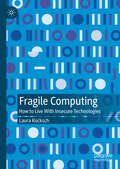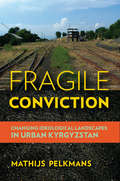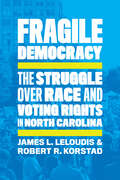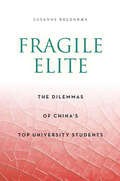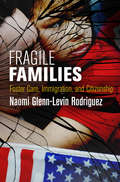- Table View
- List View
Fox News and American Politics: How One Channel Shapes American Politics and Society (Routledge Studies in Political Psychology)
by Dan CassinoIn recent years, scholars have argued that the ability of people to choose which channel they want to watch means that television news is just preaching to the choir, and doesn’t change any minds. However, this book shows that the media still has an enormous direct impact on American society and politics. While past research has emphasized the indirect effects of media content on attitudes – through priming or framing, for instance – Dan Cassino argues that past data on both the public opinion and the media side wasn’t detailed enough to uncover it. Using a combination of original national surveys, large scale content analysis of news coverage along with data sets as disparate as FBI gun background checks and campaign contribution records, Cassino discusses why it’s important to treat different media sources separately, estimating levels of ideological bias for television media sources as well as the differences in the topics that the various media sources cover. Taking this into account proves that exposure to some media sources can serve to actually make Americans less knowledgeable about current affairs, and more likely to buy into conspiracy theories. Even in an era of declining viewership, the media – especially Fox News – are shaping our society and our politics. This book documents how this is happening, and shows the consequences for Americans. The quality of journalism is more than an academic question: when coverage focuses on questionable topics, or political bias, there are consequences.
Fox Tossing
by Edward Brooke-HitchingIn the spirit of Schott's Miscellany and The Dangerous Book for Boys, a quirky collection of history's most bizarre sports and stories of mankind's most daring and ridiculous recreational pursuits--from baby boxing, to octopus wrestling, and ice tennis.Have you ever wondered what people did for fun throughout history? Edward Brooke-Hitching began to wonder the same thing while flipping through an eighteenth-century German book on hunting, and found a bygone sport in which German nobles launched foxes into the air. This random discovery of a game that slipped through the mainstream historical cracks led him to wonder: how many other sports have been left out of modern history accounts? Now, Brooke-Hitching shares his hilarious journey to discover the curious recreations contrived by mankind that have long since gone extinct (for good reason). Compiling more than 100 of the most puzzling, cruel, and ludicrous games that have ever been played, including Aerial Golf, Hidden Hunting, Ski Ballet, Eel Pulling, and many more, Brooke-Hitching chronicles an entertaining romp through forgotten leisurely pastimes that history wanted you to forget--and that you definitely shouldn't try at home. An illuminating gift book filled with acerbic humor and charming illustrations, Fox Tossing is sure to be enjoyed by many--and will let you take solace in knowing that at least your grandfather wasn't the genius who invented "Tortoise Racing," or any of the other games too stupid, or too harmful to withstand the test of time.
Foxfire 9 (Foxfire Series #9)
by Eliot WiggintonFoxfire highlights the twentieth year of the Foxfire high school program with a new volume as fascinating as its predecessors. Included are general stores, the Jud Nelson wagon, a praying rock, a Catawban Indian potter, haint tales, quilting, home cures, and the log cabin revisited.From the Trade Paperback edition.
Foxfire Story: Oral Tradition in Southern Appalachia
by Foxfire Fund IncSince 1972, the Foxfire books have preserved and celebrated the culture of Southern Appalachia for countless readers all around the world. In Foxfire Story, folklorist (and Foxfire director) T.J. Smith collects some of his favorite stories from the archives to illuminate the oral traditions that have been part of the culture of the mountains for centuries. Here are instances of mountain speech, proverbs and sayings, legends, folktales, anecdotes, songs, and pranks and jests, along with ghost tales and accounts of folk belief, as well as stories from half a dozen of the region&’s finest storytellers. Through these examples, Smith examines the role storytelling plays in the Southern Appalachian community, identifying the rich traditions that can be found in the region and exploring how they convey a sense of place—and of identity.
Fracas in the Foothills
by Elliot PaulFracas in the Foothills, first published in 1940, is a rollicking, fast-paced action – western – mystery – adventure story set in the 1930s and moving from Paris to the American West (especially in the lower Yellowstone River valley Montana). The book features scholar-sleuth Homer Evans, the subject of several books by author Elliot Paul, and a host of additional, often wacky characters including his French cohorts, gangsters, Native Americans, ranchers, rustlers, and even rattlesnakes. Evans and his group return to Montana to solve a murder but the plot takes many often humorous twists along the way.
Fracking the Neighborhood: Reluctant Activists and Natural Gas Drilling (Urban and Industrial Environments)
by Jessica Smartt GullionWhat happens when natural gas drilling moves into an urban area: how communities in North Texas responded to the environmental and health threats of fracking.When natural gas drilling moves into an urban or a suburban neighborhood, a two-hundred-foot-high drill appears on the other side of a back yard fence and diesel trucks clog a quiet two-lane residential street. Children seem to be having more than the usual number of nosebleeds. There are so many local cases of cancer that the elementary school starts a cancer support group. In this book, Jessica Smartt Gullion examines what happens when natural gas extraction by means of hydraulic fracturing, or “fracking,” takes place not on wide-open rural land but in a densely populated area with homes, schools, hospitals, parks, and businesses. Gullion focuses on fracking in the Barnett Shale, the natural-gas–rich geological formation under the Dallas–Fort Worth metroplex. She gives voice to the residents—for the most part educated, middle class, and politically conservative—who became reluctant anti-drilling activists in response to perceived environmental and health threats posed by fracking.Gullion offers an overview of oil and gas development and describes the fossil-fuel culture of Texas, the process of fracking, related health concerns, and regulatory issues (including the notorious “Halliburton loophole”). She chronicles the experiences of community activists as they fight to be heard and to get the facts about the safety of fracking.Touted as a greener alternative and a means to reduce dependence on foreign oil, natural gas development is an important part of American energy policy. Yet, as this book shows, it comes at a cost to the local communities who bear the health and environmental burdens.
Fractal Analysis
by Clifford T. Brown Larry S. LiebovitchA specialized presentation of fractal analysis oriented to the social sciences This primer uses straightforward language to give the reader step-by-step instructions for identifying and analyzing fractal patterns and the social process that create them. By making fractals accessible to the social science students, this book has a significant impact on the understanding of human behavior. This is the only book designed to introduce fractal analysis to a general social science audience.
Fractal Geometry in Human Geography and Planning (ISTE Invoiced)
by Cécile TannierThe aim of this book is to provide an overview of the concepts and methods used in fractal analysis and modeling in order to study the spatial distribution of human settlements. The main concepts and mathematical tools are reviewed, and emphasis is placed on the practical benefits of their application and the pitfalls to be avoided when using them. The first part of the book is devoted to the basic concepts and geometric reference figures required for fractal analysis in human geography. In the second part, the principles of four major families of analysis methods are explained in detail: fractal analyses of point sequences, fractal methods for morphological delineation of urban agglomerations, multifractal analyses and cross scale signatures. The third part of the book is devoted to applications of fractal geometry in urban and regional planning.
Fractal Repair: Queer Histories of Modern Jamaica (Perverse Modernities: A Series Edited by Jack Halberstam and Lisa Lowe)
by Matthew ChinIn Fractal Repair, Matthew Chin investigates queerness in Jamaica from early colonial occupation to the present, critically responding to the island’s global reputation for extreme homophobia and anti-queer violence. Chin advances a theory and method of queer fractals to bring together genealogies of queer and Caribbean formation. Fractals—a kind of geometry in which patterns repeat but never exactly in the same way—make visible shifting accounts of Caribbean queerness in terms of race, gender, and sexual alterity. Drawing on this fractal orientation, Chin assembles and analyzes multigenre archives, ranging from mid-twentieth-century social science studies of the Caribbean to Jamaica’s National Dance Theatre Company to HIV/AIDS organizations, to write reparative histories of queerness. Chin’s proposal of a fractal politics of repair invests in the horizon of difference that repetition materializes, and it extends reparations discourses intent on overcoming the past and calculating economic compensation for survivors of violence.
Fractal Time: The Secret Of 2012 And A New World Age
by Gregg BradenIn his latest book, former senior computer systems designer and bestselling author Gregg Braden merges these ancient and modern world views into a powerful new model of time. Marrying the modern laws of fractal patterns to the ancient concept of cycles, he demonstrates how everything from the war and peace between nations to our most joyous relationships and personal crises are the returning patterns of our past. As each pattern returns, it carries the same conditions of previous cycles-fractal patterns that can be known, measured and predicted! What makes this model so important today is that the returning cycles also carry a window of opportunity-a choice point-that allows us to choose a new outcome for the cycle. Braden suggests that if we can see time from this perspective, the patterns will show us what's in store for the future, and perhaps how to avoid the mistakes of our past. After presenting the case histories that confirm the accuracy of fractal time calculations, the author crosses the traditional boundaries of science and spirituality to answer the question that must be asked: What does fractal time tell us about 2012, and beyond? Because the cycles repeat, the seed for 2012 has already happened and the pattern already exists! In a narrative format of easy-to-read science and true-life accounts, Fractal Time shows us what we can expect as we close the Great World Age described by the Mayan Calendar, and the secret to our moment in history.
Fractivism: Corporate Bodies and Chemical Bonds
by Sara Ann WylieFrom flammable tap water and sick livestock to the recent onset of hundreds of earthquakes in Oklahoma, the impact of fracking in the United States is far-reaching and deeply felt. In Fractivism Sara Ann Wylie traces the history of fracking and the ways scientists and everyday people are coming together to hold accountable an industry that has managed to evade regulation. Beginning her story in Colorado, Wylie shows how nonprofits, landowners, and community organizers are creating novel digital platforms and databases to track unconventional oil and gas well development and document fracking's environmental and human health impacts. These platforms model alternative approaches for academic and grassroots engagement with the government and the fossil fuel industry. A call to action, Fractivism outlines a way forward for not just the fifteen million Americans who live within a mile of an unconventional oil or gas well, but for the planet as a whole.
Fractured Cities: Capitalism, Community and Empowerment in Britain and America
by Brian D. JacobsAnglo-American cities face economic decline, social polarisation and racial conflict. Their fate is increasingly decided by the global actions of transnational corporations and market forces. Community groups find it difficult to gain access to the political system. Ethnic minorities strive for empowerment while indebted city governments battle to maintain basic services. Such is the urban crisis of the 1990s. Fractured Cities describes the political economy of urban change and explores the future of the city.
Fractured Communities: Risk, Impacts, and Protest Against Hydraulic Fracking in U.S. Shale Regions (Nature, Society, and Culture)
by Peter Hall Stephanie A. Malin Suzanne Staggenborg Anthony E. Ladd Hilary Boudet Sherry Cable Brittany Gaustad James Maples Tamara Mix Carmel Price Dakota K.T. Raynes Stacia Ryder Trang Tran Ion Bogdan Vasi Cameron Thomas Whitley Patricia WidenerWhile environmental disputes and conflicts over fossil fuel extraction have grown in recent years, few issues have been as contentious in the twenty-first century as those surrounding the impacts of unconventional natural gas and oil development using hydraulic drilling and fracturing techniques—more commonly known as “fracking”—on local communities. In Fractured Communities, Anthony E. Ladd and other leading environmental sociologists present a set of crucial case studies analyzing the differential risk perceptions, socio-environmental impacts, and mobilization of citizen protest (or quiescence) surrounding unconventional energy development and hydraulic fracking in a number of key U.S. shale regions. Fractured Communities reveals how this contested terrain is expanding, pushing the issue of fracking into the mainstream of the American political arena.
Fractured Emerald: Ireland
by Emily HahnThe New Yorker contributor&’s fascinating account of Irish history from legendary kings to occupation, independence, and modern political strife. The author of The Soong Sisters and China to Me turns her observant and discerning eye to the oft‑troubled land of Ireland. In a magisterial combination of historical research and keen personal observation on the scene, Emily Hahn gives us a view of the whole of Ireland and its history, from the legends of the great kings and the heroes of myth to the Saint who converted Ireland to Christianity many centuries ago to modern times. She details the trials and tribulations of a conquered people as they rebel against their exploiters and fight and die for independence, eventually achieving their goal but only at the price of a bitter partition that haunts the country to this day. Hahn&’s breadth of vision and acute sense of the telling detail paints the big picture while also pinpointing the small but important moments. Perhaps the subtitle manages to encapsulate it all: Ireland, Its Legends, Its History, Its People from St. Patrick to Bernadette Devlin.
Fractured Militancy: Precarious Resistance in South Africa after Racial Inclusion
by Marcel ParetDrawing on extensive ethnographic fieldwork and interviews with activists, Fractured Militancy tells the story of postapartheid South Africa from the perspective of Johannesburg's impoverished urban Black neighborhoods. Nearly three decades after South Africa's transition from apartheid to democracy, widespread protests and xenophobic attacks suggest that not all is well in the once-celebrated "rainbow nation." Marcel Paret traces rising protests back to the process of democratization and racial inclusion. This process dangled the possibility of change but preserved racial inequality and economic insecurity, prompting residents to use militant protests to express their deep sense of betrayal and to demand recognition and community development. Underscoring remarkable parallels to movements such as Black Lives Matter in the United States, this account attests to an ongoing struggle for Black liberation in the wake of formal racial inclusion.Rather than unified resistance, however, class struggles within the process of racial inclusion produced a fractured militancy. Revealing the complicated truth behind the celebrated "success" of South African democratization, Paret uncovers a society divided by wealth, urban geography, nationality, employment, and political views. Fractured Militancy warns of the threat that capitalism and elite class struggles present to social movements and racial justice everywhere.
Fractured Rebellion: The Beijing Red Guard Movement
by Andrew G. WalderFractured Rebellion is the first full-length account of the evolution of China’s Red Guard Movement in Beijing, the nation’s capital, from its beginnings in 1966 to its forcible suppression in 1968. Andrew Walder combines historical narrative with sociological analysis as he explores the radical student movement’s crippling factionalism, devastating social impact, and ultimate failure. Most accounts of the movement have portrayed a struggle among Red Guards as a social conflict that pitted privileged “conservative” students against socially marginalized “radicals” who sought to change an oppressive social and political system. Walder employs newly available documentary evidence and the recent memoirs of former Red Guard leaders and members to demonstrate that on both sides of the bitter conflict were students from comparable socioeconomic backgrounds, who shared similar—largely defensive—motivations. The intensity of the conflict and the depth of the divisions were an expression of authoritarian political structures that continued to exert an irresistible pull on student motives and actions, even in the midst of their rebellion. Walder’s nuanced account challenges the main themes of an entire generation of scholarship about the social conflicts of China’s Cultural Revolution, shedding light on the most tragic and poorly understood period of recent Chinese history.
Fractured Scenes: Underground Music-Making in Hong Kong and East Asia
by Damien Charrieras François MouillotFractured Scenes is the first extensive academic account of music and sound art practices that fall outside of the scope of ‘mainstream music’ in Hong Kong. It combines academic essays with original interviews conducted with prominent Hong Kong underground/independent musicians and sound artists as well as first hand-accounts by key local scene actors in order to survey genres such as experimental/noise music, deconstructed electronic music, indie-pop, punk, garage rock, sound art and DIY ‘computer’ music (among others). It examines these Hong Kong underground music practices in relief with specific case studies in Mainland China and Japan to begin re-defining the notion of a ‘musical underground’ in the context of contemporary Hong Kong.
Fractured Times: Culture and Society in the Twentieth Century
by Eric HobsbawmBorn almost a hundred years ago in Vienna - the cultural heart of a bourgeois Mitteleurope - Eric Hobsbawm, who was to become one of the most brilliant and original historians of our age, was uniquely placed to observe an era of titanic social and artistic change. As the century progressed, the forces of Communism and Dadaism, Ibiza and cyberspace, would do battle with the bourgeois high culture fin-de-siècle Vienna represented - the opera, the Burgtheater, the museums of art and science, City Hall. In Fractured Times Hobsbawm unpicks a century of cultural fragmentation and dissolution with characteristic verve and vigour.Hobsbawm examines the conditions that created the great cultural flowering of the belle époque and held the seeds of its disintegration, from paternalistic capitalism to globalisation and the arrival of a mass consumer society. Passionate but never sentimental, Hobsbawm ranges freely across his subject: he records the passing of the golden age of the 'free intellectual' and examines the lives of great, forgotten men; he analyses the relation between art and totalitarianism and dissects cultural phenomena as diverse as surrealism, women's emancipation and the American cowboy myth. Written with consummate imagination and skill, Fractured Times is the last book from one of our greatest modern-day thinkers.
Fragebögen: Fundierte Konstruktion, sachgerechte Anwendung und aussagekräftige Auswertung (essentials)
by Stefan HollenbergStefan Hollenberg stellt in diesem essential wichtige Hinweise aus über 40 einschlägigen Fachtexten zur Entwicklung, Konstruktion, Durchführung und Auswertung von schriftlichen Fragebögen zusammen. Es eignet sich besonders gut als Leitfaden für die praktische Anwendung in Studium und Praxis.
Fragen an die Antike: Blicke in eine uns ferne und nahe Zeit
by Wolfgang WeimerDie Antike ist die Vorläuferin und die Grundlage des heutigen Europa und der Kultur, die von Europa ausging. Insoweit ist sie uns nah. In der Allgemeinbildung ist sie allerdings fast nur noch in Form von einzelnen Aussprüchen, Legenden und Mythen präsent, wie etwa: Der Würfel ist gefallen, die 300 Spartaner an den Thermopylen, der Krösus oder das Trojanische Pferd. Das ist meist eher kurios als bedeutend. Insoweit ist sie uns fern. Das Buch geht in 55 Kapiteln solchen Ansätzen nach und untersucht, ob diese Bruchstücke eine Grundlage in den antiken Texten haben, in welchem Zusammenhang sie stehen und ob man bestimmte Vorurteile ändern sollte. Auf diese Weise entsteht ein genaueres Bild der Antike aus den Quellen, das sie uns näherrücken lässt und gleichzeitig ihre Andersheit bewusst macht, nun aber so, dass uns dadurch unsere Eigenheiten klarer werden. Es gibt viel Verbindendes und viel Trennendes, und beides verschafft uns ein besseres Bewusstsein dessen, was uns ausmacht.
Fragile Computing: How to Live With Insecure Technologies
by Laura KockschThis book proposes alternative ways to engage with computer security, rooted in Science and Technology Studies (STS) and extensive ethnographic observations. Computer security, the author argues, is part of living in the Anthropocene – an age of damaged more-than-human relations. As such, doing computer security means not striving for technical solutions, or individual awareness, but living with fragility. The book suggests conceptual approaches and methods of studying computer security which contribute to current debates on infrastructural breakdown and ecological ruins in STS and Anthropology, while offering new perspectives to Usable Security and Critical Security Studies.
Fragile Conviction: Changing Ideological Landscapes in Urban Kyrgyzstan
by Mathijs PelkmansHow do specific secular and religious ideologies—such as nationalism, neoliberalism, atheism, Pentecostalism, Tablighi Islam, and shamanism—gain popularity and when do they lose traction? To answer these questions, Mathijs Pelkmans critically examines the trajectories of a range of ideologies as they move into the post-Soviet frontier in Central Asia. Ethnographically rooted in the everyday life of a former mining town in southern Kyrgyzstan, Fragile Conviction shows how residents have dealt with the existential and epistemic crises that arose after the collapse of the Soviet Empire. Residents became enchanted by the truths of Muslim and Christian missionaries, embraced the teachings of neoliberal and nationalist ideologues, and were riveted by the visions of shamanic healers. But no matter how much enthusiasm and hope these ideas first engendered, the commitment to any of them rarely lasted very long.Pelkmans finds that there is an inverse relationship between the tenacity and the effervescence of collective ideas, between their strength to persist and their ability to trigger committed action. Introducing the concept of pulsation, he argues in Fragile Conviction that ideational power must be understood in relation to three aspects: the voicing of the idea, its tension with everyday reality, and its reverberation within groups of listeners. The conclusion that the power of conviction is rooted in the instability of sociocultural contexts is a message that has relevance far beyond urban Central Asia.
Fragile Democracy: The Struggle over Race and Voting Rights in North Carolina
by Robert R. Korstad James L. LeloudisAmerica is at war with itself over the right to vote, or, more precisely, over the question of who gets to exercise that right and under what circumstances. Conservatives speak in ominous tones of voter fraud so widespread that it threatens public trust in elected government. Progressives counter that fraud is rare and that calls for reforms such as voter ID are part of a campaign to shrink the electorate and exclude some citizens from the political life of the nation.North Carolina is a battleground for this debate, and its history can help us understand why--a century and a half after ratification of the Fifteenth Amendment--we remain a nation divided over the right to vote. In Fragile Democracy, James L. Leloudis and Robert R. Korstad tell the story of race and voting rights, from the end of the Civil War until the present day. They show that battles over the franchise have played out through cycles of emancipatory politics and conservative retrenchment. When race has been used as an instrument of exclusion from political life, the result has been a society in which vast numbers of Americans are denied the elements of meaningful freedom: a good job, a good education, good health, and a good home. That history points to the need for a bold new vision of what democracy looks like.
Fragile Elite: The Dilemmas of China's Top University Students
by Susanne BregnbækChina's One Child Policy and its rigorous national focus on educational testing are well known. But what happens to those "lucky" few at the very top of the pyramid: elite university students in China who grew up under the One Child Policy and now attend the nation's most prestigious universities? How do they feel about having made it to the top of an extremely competitive educational system—as their parents' only child? What pressures do they face, and how do they cope with the expectations associated with being the best? Fragile Elite explores the contradictions and perplexities of being an elite student through immersive ethnographic research conducted at two top universities in China. Susanne Bregnbæk uncovers the intimate psychological strains students suffer under the pressure imposed on them by parents and state, where the state acts as a parent and the parents reinforce the state. Fragile Elite offers fascinating insight into the intergenerational tensions at work in contemporary China and locates them within an ongoing shift in educational policy and what exactly it means to be a "quality" student, child, and citizen within Chinese society.
Fragile Families: Foster Care, Immigration, and Citizenship (Pennsylvania Studies in Human Rights)
by Naomi RodriguezIn the past decade, debates over immigrant rights and family rights, and accompanying concerns over birthright citizenship, have taken center stage in popular media and mainstream political debates. These debates, however, frequently overlook the role of the public child welfare system in the United States—the agency charged with protecting children and maintaining the integrity of families. <P><P> Based on research conducted in the San Diego-Tijuana region between 2008 and 2012, Fragile Families tells the stories of children, parents, social workers, and legal actors enmeshed in the child welfare system, and sheds light on the particular challenges faced by the children of detained and deported non-U.S. citizen parents who are simultaneously caught up in the immigration system in this border region. <P><P>Many families come into contact with child welfare services because of the precariousness of their lives—unsafe housing, unstable employment, and the conditions of violence, drug use, and domestic violence made visible by the heightened police presence in impoverished communities. Naomi Glenn-Levin Rodriguez examines the character of child welfare decision-making processes and how discretionary decisions constitute the central avenue through which race, citizenship, and other cultural processes inflect child welfare practice in a manner that disproportionately impacts Latina/o families—both undocumented and U.S. citizens. <P><P>Drawing on ethnographic fieldwork to look at how immigration enforcement and child welfare play central roles in the ongoing production of citizenship, race, and national belonging, Fragile Families focuses on the everyday experiences of Latina/o families whose lives are shaped at the nexus of child welfare services and immigration enforcement.
